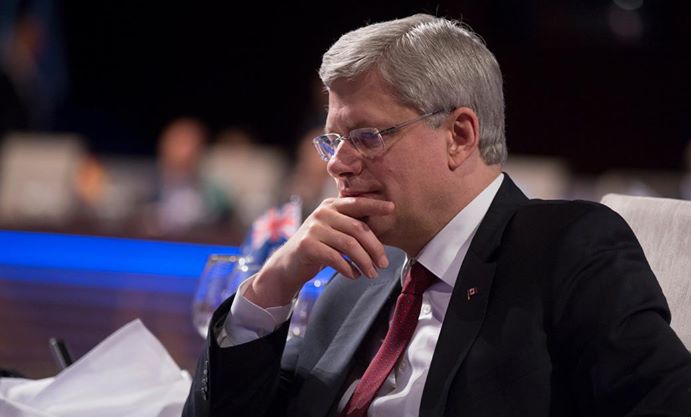Breaking
Canada prepared to take on ISIL but will do so on a budget: Harper
LONDON — Stephen Harper pledged further action Wednesday to combat the rising threat of Islamic extremism in the Middle East, but said he would do so on a frugal budget.
Speaking to a business audience in London, the prime minister joined other world leaders in reacting with horror to the execution of a second U.S. freelance journalist, Steven Sotloff, at the hands of the Islamic State in Iraq and the Levant (ISIL).
Despite the prominence of the killings — both were documented in videos posted online — there have been many other faceless victims of the group’s brutal rampage across a vast swath of northern Iraq and Syria, Harper noted.
“The fact is, this is the tip of an iceberg of literally tens of thousands of people who are being treated in this way,” Harper said, referring to the assault on Christians, Yazidis, Shiite Muslims and others who do not subscribe to ISIL’s brand of ultraconservative Sunni Islam.
He once again equated the threat posed by the militants with the rise of the Taliban in Afghanistan more than 20 years ago.
“It obviously has the capacity of not just leading regional jihad, but becoming a massive terrorist training base for the globe and I don’t think we can sit still for this.
”
Canada is prepared to do its part in concert with allies, but Harper took aim at critics both at home and abroad who say his government is not spending enough on the military.
Both the U.S. and Britain have been clamouring for all allies to commit to a 10-year plan to boost military expenditures to meet the NATO benchmark of two per cent of each nation’s gross domestic product.
Right now, Canada earmarks only one per cent of GDP.
“Our government has done significant investments in the military,” he said during a question-and-answer session with Fraser Nelson, editor of The Spectator, a weekly conservative magazine in Britain.
“We acknowledge as a government that we will likely be spending more, but we will only be spending where there is clearly need.
”
National Defence has seen its allocation slashed by more than 10 per cent since the end of the Afghan war and recent figures show spending is forecast to decline by $2.7-billion in anticipation of a balanced budget.
The government’s approach has always been to guard the federal treasury, rather than specifying a dollar figure before deciding how to spend it, he said.
“We go out and figure out what it is we need to do, and then we attempt to get a budget as frugally as possible to achieve those objectives,” Harper said.
“When it comes to spending, we can argue about spending, but the reality is this: Everything NATO has done in recent years, whether it’s been the mission to Afghanistan, the mission to Libya and now the reassurance mission to Eastern Europe, Canada has not only contributed everything that it has (been) asked in those missions, we have contributed disproportionately. So don’t tell me about how much you’re spending, tell me about how much you are doing.”
The final statement at the Wales summit later this week will describe the long-standing NATO benchmark as an “aspirational target” that countries will try to meet.






















